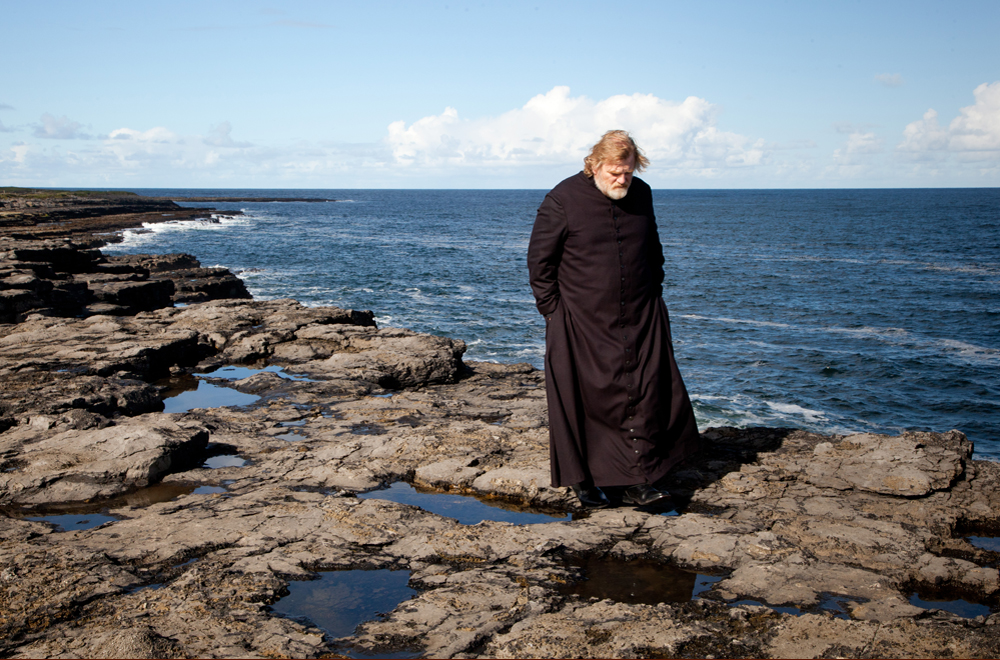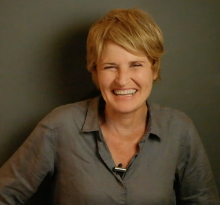
Why am I compelled to write about this movie?
First of all: Brendan Gleeson as Father James.
Second of all: the rest of the cast.
Thirdly: the meatiness of it all. Irish, yes, but no potatoes. All meat.
Oh yes, and Fourthly: the title of the film. It will become clear by the end.
Arguably the most superb actor on the planet at present, Gleeson turns his character into a robust and roiling personification of the meaning of faith. Never once out of his obsolete black cassock, Gleeson’s Father James cuts a biblical figure against the green cliffs and turbulent gray sea.
Father James is a man who is being tested. The opening scene reveals him in the Confessional, listening to the tale of a man who’d been sexually abused, by a priest, from the age of 7 on. Gleeson’s face, as he ponders a suitable response, is a topographical map of emotion. He can offer no way out for this man, no way back. Since the offending priest is dead, his parishioner explains that he intends to revenge himself on a good priest and therewith gives Father James a week, at which point they will meet on the strand the following Sunday and he will kill him. We never see the speaker, of course, and so this is a whodunit, but one so rife with profound questions that you nearly forget to ask who intends to deliver the impending doom.
So, the rest of the cast, his ‘flock’… amazing performances all around. Chris O’Dowd as the beefy butcher who James questions over the blackened eye of his lascivious wife, Oria O’Rourke. The sullen African auto-mechanic, Isaach de Bankole, who unabashedly admits he fucks the butcher’s wife and she likes it rough. A police chief who obviously has no need for the pieties of the Church, as he spends his time with a local male prostitute - a mincing, manic powder keg the likes of which might only exist in small town Ireland. And then there’s the town barkeep, more bitter than his beer. And the town’s dissolute, cynical millionaire whose family has abandoned him. And the local surgeon, an atheist so devout as to chill hell. Who amongst them is the murderer? At least we know it is not the young cannibal who Father James visits in prison (played hauntingly by Gleeson’s son Domhall) and whose expectation for understanding from God shakes Father James’ sense of a beneficent figurehead.
Even his own daughter, played by the Irish beauty Kelly Reilly, is on his case. She arrives early in the film, with bandaged wrists - the aftermath of another poor choice of lover. Her wrists are a not so subtle accusation that Father James, who was a layman for most of his life, failed her in some way.
“There’s a duty there to maintain the belief that things can be good,” Mr. Gleeson said of raising children. “In the Irish context, there’s a real problem people have believing that humanity is worth investing in. There’s such a feeling of disgruntlement and betrayal and disillusionment. And all of it is justified.”
What happens when an entire culture loses its faith? What happens when everyone has become a victim? Who can forestall the river of pain and desolation? But this is Ireland, right? Aren’t they used to all this? Yes, and they’ve more or less all come to the end of a road bitter as the sodden Irish earth.
The questions continue to emerge. Does the Church really examine sin? Who are the real sinners? The barman, whose bar is being foreclosed upon by the banks, wonders why the sins of the corporations are not spoken of in sermon. And Father James himself wonders why we obsess about sin and not virtue. The virtue of forgiveness, this is what he speaks to his daughter about, as if it will be the lifeline… even as he suffers a series of blows that would drive a normal man to outrage.

It is interesting that the two characters who offer Father James some solace are those who are on the most intimate terms with death: a Frenchwoman whose husband is killed on holiday in Ireland, and an old American writer longing to take his own life. He has one of the film’s great lines, which is more or less “Funny how when you get to be really old, nobody ever mentions death around you any more.” Yes, being Irish, Calvary has it’s own gallows humor…
McDonagh said in an interview: “People have asked if it’s the Seven Deadly Sins, but it’s actually structured around the five stages of grief, so it’s denial, anger, bargaining, acceptance and hope.”
Does Father James despair at his lack of affect on the wounded souls he must tend? One wonders, in the end, if in fact he did have an impact on one of his flock, the alienated millionaire who sought him out in the penultimate scene…
Calvary explores the loss of faith, the limits of faith, and ultimately the ideal of faith… especially in the face of man’s ineluctable imperfection. Which is not to say there is not redemption. The theme of forgiveness returns in the final scene, a wordless and very moving one in which Father James’ daughter proves that this virtue, though it requires profound effort, is indeed alive and well.
SPOILER
As anyone who has seen the film knows, it has a ripple affect afterward, provoking much thought. I found myself in a debate with someone who felt that, in the final act, Father James was giving up. I, on the other hand, felt that he made a heroic choice. It was not a forfeit; in allowing himself to be the proxy for the predatory Catholic Church, his sacrifice was Christ-like. Hence the name of Calvary. His was an act of hope.
Ellary Eddy is Editor/Publisher of Realize Magazine. You can read about her on our About page.

















